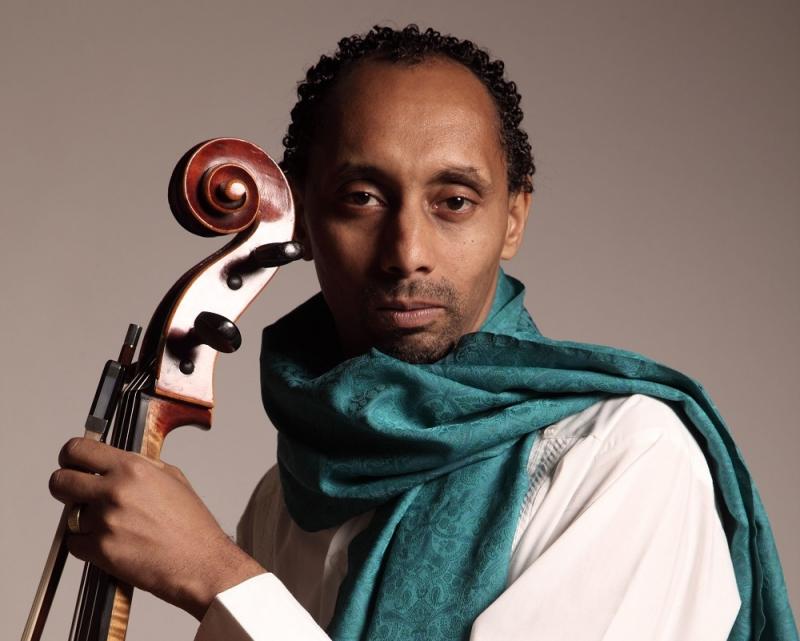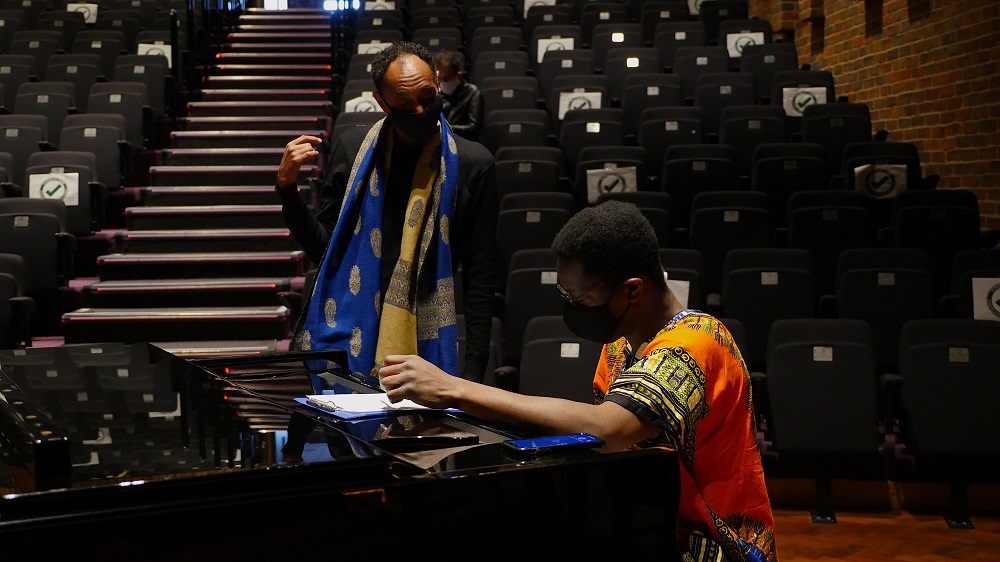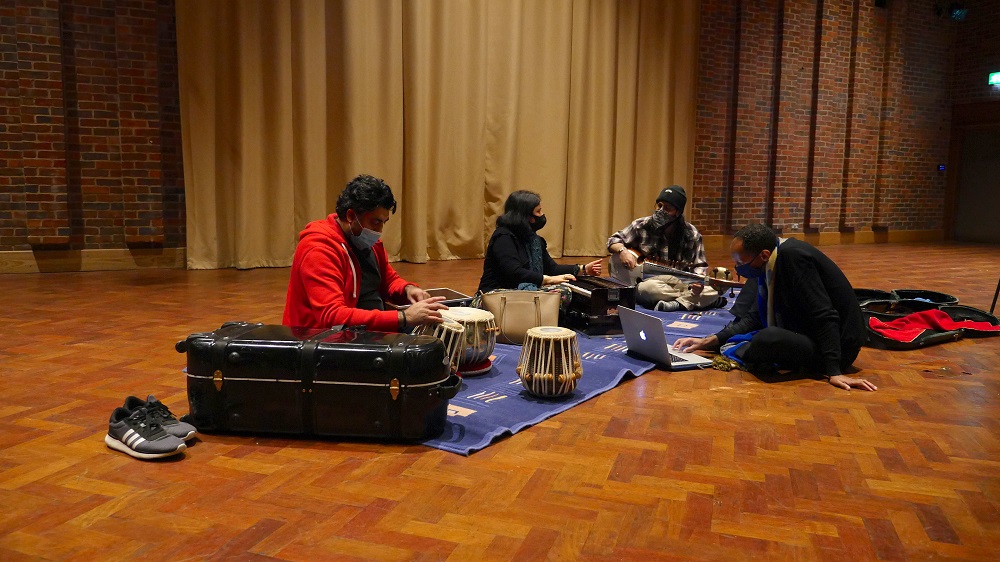First Person: composer and Renaissance man Tunde Jegede on transcending genres | reviews, news & interviews
First Person: composer and Renaissance man Tunde Jegede on transcending genres
First Person: composer and Renaissance man Tunde Jegede on transcending genres
Crossing boundaries for Southampton's 'Mayflower 400: Voyages of the Heart' project

In this era when there is so much talk and discussion around crossing musical boundaries, diversity in music and inter-disciplinary work it seems strange that there is still so little knowledge of how, why and when it works. Ironically, much of this type of work and collaborative process is much older than we often think and give credit to.
As a composer I have always been interested in this type of work because it speaks to my experience both socially and culturally. Having studied instruments and traditions in both the UK and West Africa, I was acutely aware from an early age of differences in approach and methodology in learning and understanding music. Over the years I learnt how the worldview and guiding philosophy of the music has an integral overarching impact on the shaping of the music itself. In order to really penetrate any musical tradition one must first be able to submit to that worldview and thereby speak to that inherent undercurrent. Simply hearing, appreciating and even delving into other traditions from the outside, without moving from one’s standpoint, is a very different perspective. (Pictured below by Ijaz Sumra: Tunde Jugade with pianist Jonathan Fashole-Luke in rehearsal for the Voyages of the Heart film) Many may ask what this has to do with the music itself but I would suggest that, in my opinion, it has everything to do with it. Authenticity in many traditions, particularly in many parts of Africa, is based more on the worldview than the notes of the music itself. I would qualify this by giving the example that there are several pieces in the kora tradition where it is not only the notes you are playing but how you hear the rhythmic spaces and accents between the notes that suggest whether you have truly understood the idiom. Bearing all of this in mind creates a good template for understanding how disparate musical traditions can quite easily co-exist in a composition whilst maintaining the distinct integrity of each one. Just as in wider society, one does not have to be at the expense of the other.
Many may ask what this has to do with the music itself but I would suggest that, in my opinion, it has everything to do with it. Authenticity in many traditions, particularly in many parts of Africa, is based more on the worldview than the notes of the music itself. I would qualify this by giving the example that there are several pieces in the kora tradition where it is not only the notes you are playing but how you hear the rhythmic spaces and accents between the notes that suggest whether you have truly understood the idiom. Bearing all of this in mind creates a good template for understanding how disparate musical traditions can quite easily co-exist in a composition whilst maintaining the distinct integrity of each one. Just as in wider society, one does not have to be at the expense of the other.
I have recently finished a new creation entitled Voyages of the Heart, looking at migration stories centred around the city of Southampton to mark the commemoration of the Mayflower voyage to the Americas 400 years ago. The piece brought together artists from the worlds of Soul, Gospel, Reggae, Opera, Folk and Indian Classical music, which reflected the migration stories themselves. The project was about inclusivity on a global level within all of these musical traditions, and the aim was to create a forum for the musicians, artists and creatives to be able to tap into their own essence and source. I try to find this balance in all my works, particularly those that are bi-cultural and inter-disciplinary.
Voyages of the Heart trailer
This type of project is not only about the written score, but rather the ability to draw out the root core of each genre, respecting its particular process and methodology. The composer becomes a conduit or enabler to assist in this process and the music is a vehicle for this communication. Shifting seamlessly from written to oral traditions, for me, becomes the challenge as they each house very different mindsets.
In the lead up to this performance I was rehearsing with all the sections of the group separately and it was illuminating to see the distinct processes of learning. Whilst those learning by ear were initially slower to begin with, as the project progressed there was no need for them to memorise their parts, for this was already part of their process. Learning by ear also required taking the music into the body and living with it, for which there is no short cut.
The string players, who were working with scores, had to get used to being adaptable to the fact that the music could sometimes change mid-flow, due to some of the improvisatory elements. Given the openness with which the string players came to the project, it was so easy to put everything together and make it work. This, however, was more reliant on their open approach then on the notes they had been given to play.  For the Gaelic and Indian Classical traditions (Indian performers rehearsing for Voyages of the Heart pictured above by Ijaz Sumra), I had to rely on my previous experiences working with artists from these idioms. Fortunately for me I have had the opportunity to work with some of the finest musicians in each sphere over the course of three decades, including the folk singers Ewain Mcoll and Pegger Seeger, composer/pianist Michael O Suilleabhain and Donal Lunny as well as the Indian classical artists Deepak Ram, Talvin Singh and Trilok Gurtu. Like most artists, I have learnt many things from each juncture of my journey collaborating with musicians such as these, and this has subsequently informed my musical vision as a composer ever since.
For the Gaelic and Indian Classical traditions (Indian performers rehearsing for Voyages of the Heart pictured above by Ijaz Sumra), I had to rely on my previous experiences working with artists from these idioms. Fortunately for me I have had the opportunity to work with some of the finest musicians in each sphere over the course of three decades, including the folk singers Ewain Mcoll and Pegger Seeger, composer/pianist Michael O Suilleabhain and Donal Lunny as well as the Indian classical artists Deepak Ram, Talvin Singh and Trilok Gurtu. Like most artists, I have learnt many things from each juncture of my journey collaborating with musicians such as these, and this has subsequently informed my musical vision as a composer ever since.
The musical sound-worlds I choose to work in is very much shaped by how intrinsic a genre has become to my own style of musical expression. I would therefore argue that I never cross or fuse musical styles as these have already become part of my own musical palette. It is therefore an internal process not an external one. There is no need to blend what is already part of one’s journey and experience.
This is something that I try to share with young artists that I work with internationally within any genre. When I was working for four years in Nigeria as the Artistic Director of MUSON (Musical Society of Nigeria) in Lagos I had the opportunity to work with many young musicians in the fields of jazz, opera and classical music. I would always encourage them to explore the importance of maintaining their own cultural voice as Nigerians, no matter what genre they were working in. Much of this cultural work came to fruition in the formation of two groups that ended up touring internationally; namely the NOK Orchestra and the Art Ensemble of Lagos.
Tunde Jegede on kora with players of the NOK Orchestra in 'Jairaby' from his Mandé Suite.
I think the way for the new generation of artists and musicians will be to continue as seamlessly as possible to tread these paths creating new routes within established traditions, much as it has always been. The more these artists are rooted in bi-cultural legacies the more the transcending of genres will take place without a need to label it. They will simply need techniques from both the oral and written traditions to navigate a pathway between genres, forms and idioms to find the balance that allows all of them to breathe within a unified expression. I guess this is what we are all trying to achieve ultimately.
Share this article
The future of Arts Journalism
You can stop theartsdesk.com closing!
We urgently need financing to survive. Our fundraising drive has thus far raised £49,000 but we need to reach £100,000 or we will be forced to close. Please contribute here: https://gofund.me/c3f6033d
And if you can forward this information to anyone who might assist, we’d be grateful.

Subscribe to theartsdesk.com
Thank you for continuing to read our work on theartsdesk.com. For unlimited access to every article in its entirety, including our archive of more than 15,000 pieces, we're asking for £5 per month or £40 per year. We feel it's a very good deal, and hope you do too.
To take a subscription now simply click here.
And if you're looking for that extra gift for a friend or family member, why not treat them to a theartsdesk.com gift subscription?

Add comment